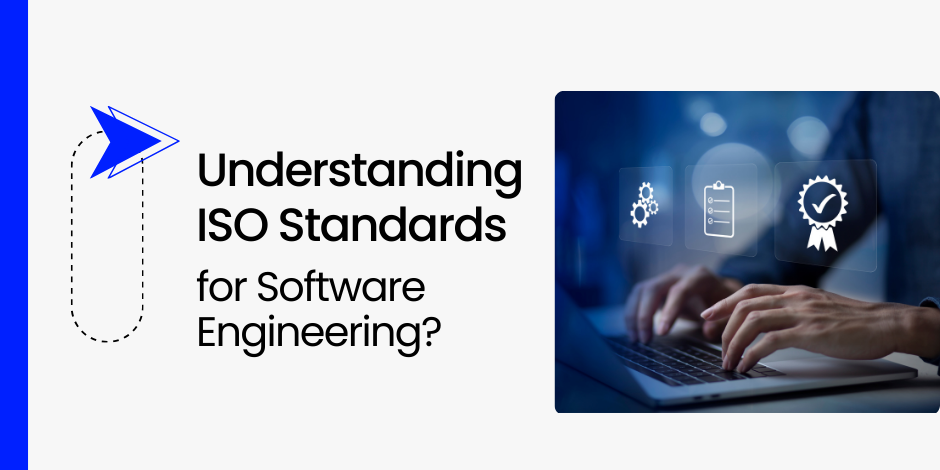Understanding ISO Standards for Software Engineering

Stay Informed With Our Weekly Newsletter
Receive crucial updates on the ever-evolving landscape of technology and innovation.
International Organisation for Standardization (ISO) standards play a crucial role in the field of software engineering.
As technology evolves and software becomes an integral part of our daily lives, ensuring its quality, reliability, and security has become increasingly important.
To grasp the scale of it, consider this: the 2020 ISO survey uncovered a staggering 1,772,371 certificates worldwide for all the major ISO standards in use.
This helps us appreciate the significance of ISO standards for software engineering.
In this article, we will delve into the world of ISO standards for software engineering, exploring their significance, key standards, certification process, and their impact on software quality.
What are ISO standards?

ISO is an independent, non-governmental international organization that develops and publishes standards.
These standards ensure that products, services, and systems are safe, reliable, and high-quality.
In the context of software engineering, ISO standards define best practices and guidelines that help organizations improve their software development processes, enhance quality, and mitigate risks.
ISO standards play a crucial role in various industries, including manufacturing, healthcare, and finance.
They provide a common framework for organizations to follow, promoting consistency and compatibility across different sectors.
By establishing a set of internationally recognized standards, ISO facilitates global trade and cooperation, enabling businesses to operate more efficiently and effectively.
ISO standards for software engineering are essential due to the rapid advancements in technology and the increasing reliance on software systems.
These standards help organizations navigate the complexities of software development, ensuring that their products meet the highest quality standards and comply with legal and regulatory requirements.
The importance of ISO standards in software engineering
ISO standards for software engineering serve as a benchmark for software companies, enabling them to align their processes with internationally recognized best practices.
By adhering to ISO standards for software engineering, organizations can demonstrate their commitment to quality and increase customer trust.
The adoption of ISO standards also helps software companies enhance collaboration and interoperability with other organizations, as they speak a common language when it comes to quality management and development processes.
Furthermore, ISO standards for software engineering provide a structured approach to software development, helping organizations identify and mitigate risks early in the process.
ISO standards also promote continuous improvement in software engineering practices.
Regularly reviewing and updating their processes to align with the latest standards allows organizations to stay ahead of the competition and deliver innovative, high-quality software solutions.
This focus on continuous improvement fosters a culture of learning and growth within the organization, driving excellence and customer satisfaction.
The origin and evolution of ISO standards
The journey of ISO standards for software engineering began in the late 1970s when the need for international software quality standards emerged.
As software systems became increasingly complex and critical to various industries, there was a growing demand for standardized practices to ensure their reliability and safety.
In response to this need, ISO established a technical committee, known as ISO/IEC JTC 1/SC 7, to develop standards for software and system engineering.
This committee comprises experts from around the world who collaborate to define the best practices and guidelines for software development, maintenance, and quality assurance.
Over the years, ISO has developed a series of standards specifically tailored to the software industry, addressing various aspects such as quality management, information security, and service management.
These standards undergo regular revisions and updates to keep pace with the ever-changing technology landscape.
The evolution of ISO standards for software engineering reflects the advancements in technology and the evolving needs of the industry.
As new challenges and opportunities arise, ISO continues to work closely with industry experts to develop standards that address emerging trends and technologies.
ISO standards for software engineering are not static documents; they are living documents that evolve with the industry.
This adaptability ensures that ISO standards remain relevant and effective in guiding software companies towards excellence.
Key ISO standards for software engineering

ISO 9001, ISO/IEC 27001, and ISO/IEC 20000-1 are among the key ISO standards relevant to the software engineering domain.
ISO 9001: Quality Management Systems
ISO 9001 sets the framework for implementing a quality management system (QMS) in an organization.
By adopting ISO 9001, software companies can establish robust processes, monitor customer satisfaction, and continuously improve their software development lifecycle.
The standard emphasizes the importance of customer focus, leadership, and evidence-based decision-making.
ISO/ International Electrotechnical Commission (IEC) 27001: Information Security Management
ISO/IEC 27001 provides a systematic approach to managing information security risks within an organization.
In an era where data breaches and cyber threats are prevalent, this standard helps software companies protect sensitive information, safeguard intellectual property, and demonstrate their commitment to information security.
ISO/IEC 20000-1: Service Management System
ISO/IEC 20000-1 outlines the requirements for implementing an effective service management system within a software organization.
This standard enables companies to manage their service delivery processes, enhance customer satisfaction, and continuously improve service levels.
By adopting ISO/IEC 20000-1, software companies can demonstrate their ability to provide reliable and efficient services to their clients.
The process of ISO certification for software companies
Obtaining ISO certification is a significant achievement for software companies, as it validates their adherence to international standards.
The process typically involves several stages, including preparation, auditing, and ongoing maintenance.
Preparing for ISO certification
Before seeking certification, software companies need to thoroughly review their existing processes and identify areas that require improvement.
This may involve documenting processes, establishing quality objectives, and training employees on the relevant ISO standards.
Additionally, companies often conduct internal audits to assess their readiness for an external audit.
The auditing process for ISO certification
Once the preparation is complete, software companies engage the services of an accredited certification body to conduct an external audit.
The auditor assesses the organization’s adherence to the specific ISO standard and identifies any non-conformities.
During the audit process, companies need to provide evidence of their compliance with the standard’s requirements.
Maintaining and renewing ISO certification
ISO certification is not a one-time achievement; it requires ongoing commitment and continuous improvement.
Software companies must establish mechanisms to monitor and measure their processes, address non-conformities promptly, and conduct regular internal audits.
Certification bodies typically conduct surveillance audits at regular intervals to ensure compliance, and recertification is required every few years.
The impact of ISO standards on software quality

ISO standards for software engineering have a profound influence on software quality, benefiting both software companies and end-users.
Enhancing software reliability with ISO standards
ISO standards emphasize the implementation of robust processes and quality control measures, resulting in more reliable software products.
ISO standards and software usability
User-centric design and usability are integral components of ISO standards for software engineering.
Applying human factors like engineering principles and usability testing ensures that software interfaces are intuitive, user-friendly, and accessible to a wide range of users.
ISO standards guide software companies in designing systems that prioritize user experience and satisfaction.
ISO standards’ role in software efficiency
ISO standards advocate for efficiency in software development processes, promoting optimization and waste reduction.
Streamlining workflows, eliminating redundancies, and setting performance objectives enable software companies to enhance productivity, reduce costs, and deliver software solutions promptly.
In conclusion
ISO standards are indispensable in the realm of software engineering.
They provide software companies with a structured framework for achieving excellence in quality, security, and service management.
Through the certification process and adherence to ISO standards, software companies can enhance their reputation, gain a competitive edge, and ultimately deliver high-quality software solutions to their clients.
Begin your journey to understanding and utilizing ISO standards for software engineering with our Software Engineering program, preparing you for a bright future in tech.
Have questions about changing careers into software engineering? Schedule a free career consultation with our team to discuss our programs in more detail.




